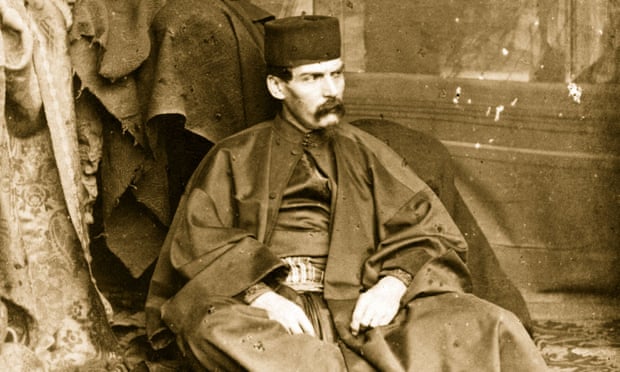Richard Francis Burton … dashing
explorer of the exotic and erotic
This fearless Victorian flirted with several ways of dying while looking for the source of the Nile, entering Mecca illegally and exploring other cultures’ attitudes toward sex.

Near death on the Nile … Richard Francis Burton became seriously ill looking for the
river’s source. Photograph: Ernest Edwards/Getty
Passport details
Sir Richard Francis Burton, geographer, translator, writer, soldier, orientalist, cartographer, ethnologist, spy, linguist, poet, fencer and diplomat.
Claim to fame
It says something about the shallowness of celebrity that a polylingual, dashing, brave, randy scholar who travelled through East Africa to try to find the source of Nile, translated The Arabian Nights into English and had the chutzpah to visit Mecca is overshadowed by a Welsh actor of the same name (with an admittedly nice speaking voice) who married Elizabeth Taylor a lot.
Supporting documentation
Burton, who was born in Torquay in 1821, lived a life of barely credible derring-do, which he recorded in dozens of books and articles. He was particularly interested in the contrast between Victorian prudery and the attitudes of other cultures towards sex and sexual morality. He translated various books of erotica into English. This and his general irascibility made him a controversial figure and hampered his subsequent career as a diplomat. However, a series of army postings gave him the chance for more travel and the time to work on his literary endeavours: the most famous of which is his multi-volume translation of One Thousand And One Nights.
His most noteworthy expeditions were the ill-fated trips to the Horn of Africa (his team was set upon by Somali nomads and Burton’s face was impaled by a javelin); the failed attempt to discover the source of the Nile — Burton ended up too sick to continue; and the insanely risky visit to Mecca, which he undertook in disguise: “a hasty action, a misjudged word … And my bones would have whitened the desert sand”. He also visited Iceland and lived for spells in Brazil, Damascus and Trieste.
Distinguishing mark
With his lush facial hair and stern physiognomy, Burton was the physical archetype of the Victorian explorer. Yet, he seems to have been sceptical about the British imperial project. His undoubted superpower was an ability to learn languages. He claimed to have developed a system that enabled him to master most languages in a couple of weeks and could speak dozens, including German, Urdu, Marathi, Greek and Arabic. However, he admitted defeat in his attempts to learn Russian.
Last sighted
In death, Burton even managed to bring a whiff of orientalism to the buttoned-up London cemetery in Mortlake. The mausoleum he shares with his wife Isabel is a marble tent with a ladder in the back that leads up to a small window. Through it, you can see the great explorer’s dusty coffin surrounded by knick-knacks brought back from his trips overseas.
Intrepidness rating
The trip along the Nile almost killed him and the trip to Mecca would have led to his execution if his true identity had been discovered.

